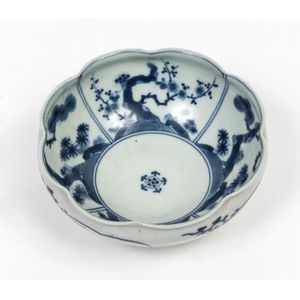Edo Dynasty Blue and White Porcelain Bowl
A Japanese Arita blue and white porcelain bowl, Edo Dynasty, 18th/19th century, the lobed sides decorated on the interior with pine and prunus, the base with six-character mark of Chenghua, 16.5 cm diameter
You must be a subscriber, and be logged in to view price and dealer details.
Subscribe Now to view actual auction price for this item
When you subscribe, you have the option of setting the currency in which to display prices to $Au, $US, $NZ or Stg.
This item has been sold, and the description, image and price are for reference purposes only.
- Ming Dynasty - The Ming Dynasty was a ruling dynasty of China from 1368 to 1644. It succeeded the Yuan Dynasty and preceded the Qing Dynasty. The Ming Dynasty was established by Zhu Yuanzhang, a former Buddhist monk who became a rebel leader and eventually overthrew the Mongol Yuan Dynasty. During the Ming Dynasty, China experienced a period of relative stability and prosperity. The government was centralized and bureaucratic, with the emperor at the top of the hierarchy. The Ming Dynasty is known for its cultural achievements, including the development of porcelain, the invention of movable type printing, and the construction of the Great Wall of China.
- Edo Period, Japan - The Edo period in Japan lasted from 1603 to 1868. During this time, Japan was ruled by the Tokugawa shogunate, a military government led by the Tokugawa family. The Edo period is characterized by a period of relative peace, stability, and economic growth, as well as by the development of a distinctive culture and society.
During the Edo period, the capital of Japan was moved from Kyoto to Edo (modern-day Tokyo), and the country became increasingly isolated from the rest of the world. The shogunate implemented strict policies to maintain control, including the restriction of foreign trade and travel. However, despite this isolation, the Edo period saw significant cultural and artistic development, including the emergence of the ukiyo-e woodblock print tradition, the growth of Kabuki theater, and the flourishing of a vibrant merchant culture.
The Edo period ended with the Meiji Restoration of 1868, which saw the collapse of the shogunate and the restoration of imperial rule.
This item has been included into following indexes:
